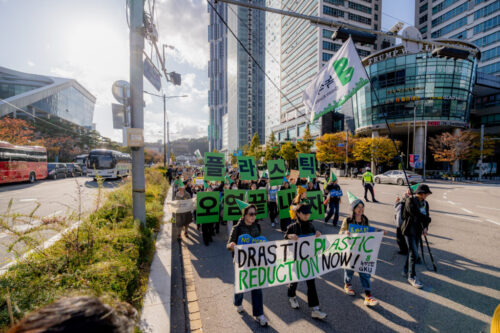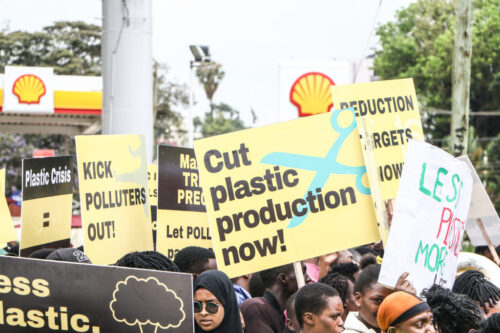Featured image by Samuel Schalch / Greenpeace
Last week in Geneva, the world held strong for a Global Plastics Treaty that will actually stop the fossil fuel industry and its plastic crisis. The version of the treaty at the end of the talks was dangerously weak and would have locked in plastic production increases for years to come. Rather than assenting for the sake of consensus, the world majority said no – forcing the process to continue and keeping the fight for a powerful treaty alive.
Up against the absolute rigidity of oil- and gas-rich countries, record numbers of fossil fuel lobbyists in attendance, and intense pressure to finally close a deal, it took immense courage and commitment to hold the line. But 120 countries did – in no small part due to civil society and the bravery of an expanding number of countries. For the last decade, the global grassroots movement has served as the backbone of ambition, holding countries to account.
Global momentum to end the plastic crisis
A growing worldwide movement is demanding an end to the plastic crisis. People and organizations from scientists and businesses, to environmentalists, Indigenous peoples, wastepickers, and frontline communities, have all stood up, changing the tide of public opinion so a global majority now support the end of single use plastic.
In 2022, this led to the UN’s Environment Assembly adopting an historic resolution to develop a Global Plastics Treaty addressing the full life cycle of plastic. The chair of the International Negotiating Committee (INC) leading this process acknowledges that it never would have happened without civil society leading the way.
The process was to be completed with the fifth session in Busan, South Korea in late 2024. But after Big Oil and the countries that benefit from it stalled the process, countries protecting an effective treaty and civil society behind them pushed for another session. Held from August 5th to the 15th in Geneva, this was INC-5.2.
What happened at INC-5.2
In spite of the global turning tide, the small grouping of oil- and gas-rich countries yet again refused to negotiate in good faith, stalling and impeding the process at every turn. Faced with a text inflated by 1,500 points of disagreement, the INC chair introduced a new, streamlined version of the text one day before the session was supposed to end. But this removed the most important provisions, lacking mandatory cuts to production, any mention of the dangers caused by toxic chemicals and a dedicated provision on health. Such a treaty would have allowed plastic production to continue escalating while giving the industry and its supporter states cover for having “negotiated.”
Thankfully, countries refused to accept such an unbalanced attempt at consensus. A clear majority rejected it outright, with a number giving powerful speeches in the plenary.
The Panamanian delegation said it best: “This is not about closing a treaty at any cost. It is about closing a wound that we’re leaving open in people’s lungs, in our rivers and our oceans. The text presented here makes that wound fatal and we will not accept it.”
After the widespread denouncement of the text, the Chair attempted one final version, but with only marginal improvement. So once again the world majority refused it, requiring the process continue on into a next session and preserving the fight for an ambitious treaty.
What we accomplished
Not only was the proposed text shut down, but its overreach grew the resistance. The High Ambition Coalition that advocate for a strong treaty added new countries to their number. 113 countries stood together to reject the weak text, compared to the 95 countries that called for an ambitious treaty only two months earlier. And the opposition continued to grow, with increased activity from scientists and the business community, both calling for stronger provisions.
As evidence of this deepening, the majority of member states found new alignment on crucial provisions of the text. They established new agreements around controlling the toxic chemicals used in plastic that threaten people and the environment, adding dozens of countries to previous proposals. They identified new concepts for toxic-free reuse systems and targets. And they developed stronger standards for protecting human health.
Civil society was crucial to this work. Organizations used their expertise to support member states in the development of conference papers around key provisions. They released numerous reports and held innovative demonstrations generating media to call attention to the crisis and ensuring delegations knew the world was watching. At this critical juncture, the movement continues to serve as the guiding light and groundswell of power for the way forward.
What’s next
The chair concluded INC-5.2 by acknowledging that the effort would continue. But we can’t let this recent history repeat itself again. With the world’s majority committed to ending the plastic crisis, there are multiple possibilities for a better way forward. These ambitious countries can either work together within the UN mandate to establish improved processes – like empowering chairs to move talks forward, shutting out fossil fuel lobbyists, or enacting majority voting – or they can go beyond it. There is precedent for treaties negotiated outside the UN, like the land mines convention that sits outside of the UN but remains closely aligned.
What’s clear is, an international regime that turns off the plastic tap and shuts down petrochemical expansion is still within our grasp. We can, and will, cross that finish line.
Wednesday August 20th, 2025




